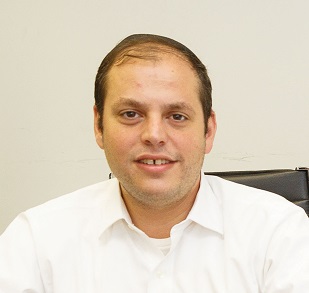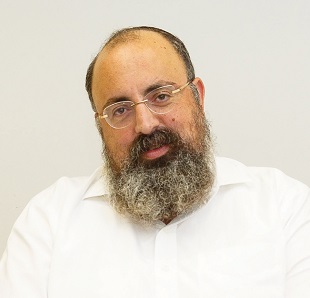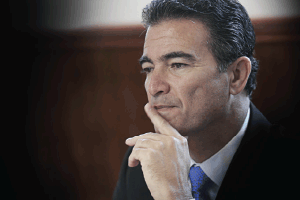My Son, The Spy



Yossi Cohen is smart, charismatic, and fearless — and he’s also the first religious Mossad chief since the institution was founded. His parents, Reb Aryeh and Mina Cohen — both from old-time Yerushalmi families with roots going back to Minsk and Lubavitch — talk about how heroism in their family comes in all colors

“It was an unforgettable Shabbos, an example of true Jewish heroism — the gevurah of a child who grew up in a home where ‘Jewish hero’ was part of his DNA,” says Aryeh Cohen, remembering the bar mitzvah Shabbos of his brave, inspiring grandson Yonatan. Reb Aryeh is the father of newly appointed Mossad head Yossi Cohen — the first shomer Shabbos Mossad chief since the secret-service institution was founded — and Yonatan is Yossi Cohen’s special son.
Since infancy, Yonatan has suffered from cerebral palsy, as a result of a premature birth with insufficient oxygen, but from his wheelchair, he’s done his father proud. He can’t walk, can’t read as he’s legally blind, and can’t write, but he finished school as a multilingual honors student and even served in the IDF intelligence corps for several years.
We were sitting with Aryeh and Mina Cohen in their Jerusalem living room to hear about their son Yossi — the number-one man in Israel’s wide-ranging international security apparatus and former handler of an international ring of secret agents — but Yossi and Yonatan are really part of the same story.
“Yonatan is the real hero,” Yossi Cohen told the press at the time of his recent appointment as Mossad chief.
Yonatan’s bar mitzvah was 16 years ago, but the senior Cohens still remember every detail. “Yossi was living in Vienna then, involved in some mission that of course we have — nor ever will have — any idea about,” says Mina Cohen, “and Yonatan was studying in a special school in Hungary. But he had no intention of giving up on any of the regular bar mitzvah ‘duties.’ Aryeh sent Yonatan a tape with the brachos and the haftarah with the trop. For months, Yonatan listened to the recording, refusing to give up until he knew every nuance by heart.
“We all traveled to Vienna for the bar mitzvah,” Mrs. Cohen continues, “and it was a sight that makes me cry whenever I think about it — when it was time for Yonatan’s aliyah, Yossi and our other son Chaim came over to lift his wheelchair up to the bimah but Yonatan adamantly refused. ‘It’s not kevod haTorah to go in a wheelchair,’ Yonatan whispered to his father and his uncle. So the congregation waited while Yossi and Chaim held him from each side, and he actually forced himself into a standing position in front of the sefer Torah. He read like a real hero and there wasn’t a dry eye in the shul.”
This isn’t just the story of one boy who decided not to let his physical handicap hold him back from moving forward; rather it symbolizes an entire family — a family that copes with all kinds of obstacles and handicaps, that puts the security of the Holy Land before its own needs, and that refuses to be intimidated by lurking dangers when it comes to defending Jews — all without compromising mitzvah observance.
Sons in the Shadows
Reb Aryeh and Mina Cohen — both from old-time venerated Yerushalmi families with roots going back to Minsk and Lubavitch — are modest people who’ve always shunned accolades or publicity. But today their son Yossi stands at the pinnacle of the State of Israel’s exterritorial intelligence community — he is the director of the Institute for Intelligence and Special Operations, or, by its better-known name: the Mossad.
It wasn’t easy to set up a meeting with Reb Aryeh. Although in his 80s, he still maintains a busy schedule that would tire out many who are years younger. His day starts in his local shul in Jerusalem’s Katamon neighborhood, and continues in the beis medrash of the Great Synagogue, where he spends hours learning Gemara and halachah in a kollel of his relative, Rav Yisrael Druk. When he returns home for lunch, his wife Mina is waiting for him with a hot meal (“The refrigerator is always full, even an army brigade won’t put me out”); later on, he volunteers in the Bnei Brit organization for assistance to the needy, and is an active board member of Beit Midrash Be’er Miriam and of Herzog Hospital, where he is responsible for the hospital’s financial investments.
Mrs. Cohen is a counselor for couples in crisis, teaches Tanach, and volunteers in organizations that help the needy and youth in crisis — all this besides the Torah study that is so dear to her from her days growing up in Shaarei Chesed together with the children of Rav Shlomo Zalman Auerbach, who was their neighbor.
The residents of Shai Agnon Street in Katamon know that the Cohen house is the home of Cohen the banker with the senior position in Bank Mizrachi who never misses a minyan for Bircas Kohanim, and of his wife Mina the educator. They also know it’s always been a place for anyone who needed an encouraging word, a warm meal, wise counsel, some human warmth, or even a bed to lie in. But not all the neighbors know that this home — founded on punctiliousness in halachah, ahavas Hashem, and ahavas Yisrael — raised two of the central figures influencing Israel’s security and economy.
For years, the two Cohen boys — graduates of Yeshivat Netiv Meir and Yeshivat Or Etzion — stayed in the shadows, and few knew of the power they wielded. There is Yossi, director of the Mossad, and his wife Ayah, head nurse of oncology at Hadassah Medical Center; and there’s Chaim, a senior economist who served as CEO of Dun and Bradstreet in Israel, and his wife Zahavit, managing director of the investment firm Apax Partners-Israel.
Crisis Control
When Yossi Cohen replaced Tamir Pardo as head of the Mossad earlier this year, the appointment received mixed reactions. Some saw it as one more in a string of appointments of people from religious families who were taking over key positions in the country — but those skeptics never met Yossi. His hundreds of admirers, from all walks of life and all over the world, from the shul in Modiin that he helped build, to his classmates from yeshivah, to his connections in the capitals of Europe where he held secret postings over the years, reacted differently. They were happy that a brilliant, courageous believing Jew with grounded religious ideals would be at the helm to navigate the only democracy in the Middle East during such a sensitive time for Israel and the entire region.
“The values that I was raised with,” Cohen recently told an audience of yeshivah students, “are Am Yisrael, Torat Yisrael, and Eretz Yisrael. These are the values that have guided me all over the world, and have always protected me.”
Oops! We could not locate your form.













